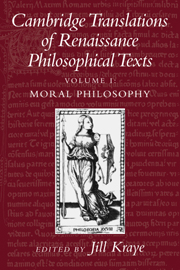Book contents
- Frontmatter
- Contents
- List of Translators
- Preface
- PART I CONCEPTS OF MAN
- PART II ARISTOTELIAN ETHICS AND THE SUPREME GOOD
- PART III ARISTOTELIAN ETHICS AND CHRISTIANITY
- 9 Juan Luis Vives
- 10 Philipp Melanchthon
- 11 Antonius de Waele
- PART IV PLATONIC ETHICS
- PART V STOIC ETHICS
- PART VI EPICUREAN ETHICS
- Bibliography of Renaissance Moral Philosophy Texts Available in English
- Index Nominum
- Index Rerum
10 - Philipp Melanchthon
Published online by Cambridge University Press: 05 June 2012
- Frontmatter
- Contents
- List of Translators
- Preface
- PART I CONCEPTS OF MAN
- PART II ARISTOTELIAN ETHICS AND THE SUPREME GOOD
- PART III ARISTOTELIAN ETHICS AND CHRISTIANITY
- 9 Juan Luis Vives
- 10 Philipp Melanchthon
- 11 Antonius de Waele
- PART IV PLATONIC ETHICS
- PART V STOIC ETHICS
- PART VI EPICUREAN ETHICS
- Bibliography of Renaissance Moral Philosophy Texts Available in English
- Index Nominum
- Index Rerum
Summary
Introduction
The German theologian and educational reformer Philipp Melanchthon (1497–1560) was the chief disciple of Martin Luther. He was born in Bretten (Palatinate), where he pursued his early studies before moving on, in 1508, to the Latin school in Pforzheim. It was at this point that his great-uncle, the humanist Johannes Reuchlin, bestowed on him the name ‘Melanchthon’, a Greek rendering of his German surname Schwarzerd. He matriculated at the University of Heidelberg in 1509 and obtained his BA two years later. In 1512 he went to the University of Tübingen, receiving his MA in 1514 and then teaching classics for a few years. He was appointed professor of Greek at Wittenberg in 1518 and, after completing his biblical studies, he also gained a chair of theology; he held both positions until his death.
Melanchthon, who became known as ‘Praeceptor Germaniae’ (the teacher of Germany), made important contributions to the humanistic reform of education. He produced editions of and commentaries on classical authors (e.g., Thucydides, Cicero, Ovid, Quintilian), as well as extremely influential textbooks of Greek and Latin grammar, natural philosophy, rhetoric, logic, psychology and numerous other subjects.
It was primarily due to the efforts of Melanchthon that Aristotle gained a central place in the Lutheran university curriculum. Early in his career, Luther had been extremely hostile to Aristotle, regarding the Nicomachean Ethics as a pernicious work which was directly opposed to the Christian doctrine of grace and of virtue.
- Type
- Chapter
- Information
- Cambridge Translations of Renaissance Philosophical TextsMoral and Political Philosophy, pp. 108 - 119Publisher: Cambridge University PressPrint publication year: 1997



